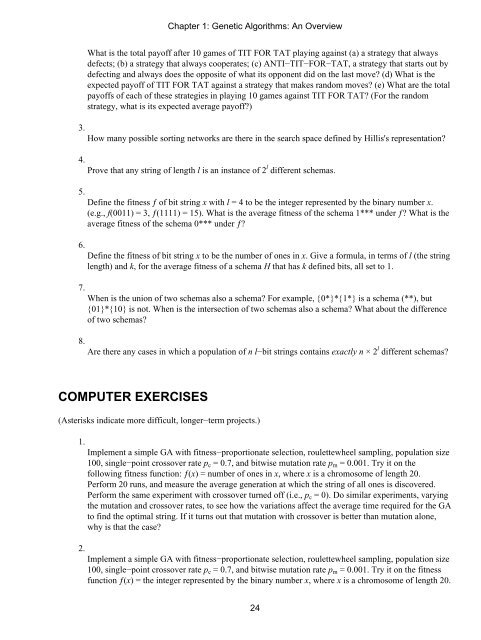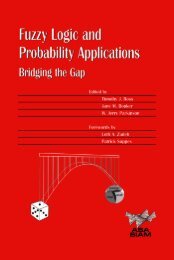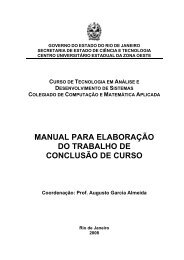An Introduction to Genetic Algorithms - Boente
An Introduction to Genetic Algorithms - Boente
An Introduction to Genetic Algorithms - Boente
You also want an ePaper? Increase the reach of your titles
YUMPU automatically turns print PDFs into web optimized ePapers that Google loves.
What is the <strong>to</strong>tal payoff after 10 games of TIT FOR TAT playing against (a) a strategy that always<br />
defects; (b) a strategy that always cooperates; (c) ANTI−TIT−FOR−TAT, a strategy that starts out by<br />
defecting and always does the opposite of what its opponent did on the last move? (d) What is the<br />
expected payoff of TIT FOR TAT against a strategy that makes random moves? (e) What are the <strong>to</strong>tal<br />
payoffs of each of these strategies in playing 10 games against TIT FOR TAT? (For the random<br />
strategy, what is its expected average payoff?)<br />
3.<br />
How many possible sorting networks are there in the search space defined by Hillis's representation?<br />
4.<br />
Prove that any string of length l is an instance of 2 l different schemas.<br />
5.<br />
6.<br />
7.<br />
Define the fitness ƒ of bit string x with l = 4 <strong>to</strong> be the integer represented by the binary number x.<br />
(e.g., f(0011) = 3, ƒ(1111) = 15). What is the average fitness of the schema 1*** under ƒ? What is the<br />
average fitness of the schema 0*** under ƒ?<br />
Define the fitness of bit string x <strong>to</strong> be the number of ones in x. Give a formula, in terms of l (the string<br />
length) and k, for the average fitness of a schema H that has k defined bits, all set <strong>to</strong> 1.<br />
When is the union of two schemas also a schema? For example, {0*}*{1*} is a schema (**), but<br />
{01}*{10} is not. When is the intersection of two schemas also a schema? What about the difference<br />
of two schemas?<br />
8.<br />
Are there any cases in which a population of n l−bit strings contains exactly n × 2 l different schemas?<br />
COMPUTER EXERCISES<br />
(Asterisks indicate more difficult, longer−term projects.)<br />
1.<br />
2.<br />
Chapter 1: <strong>Genetic</strong> <strong>Algorithms</strong>: <strong>An</strong> Overview<br />
Implement a simple GA with fitness−proportionate selection, roulettewheel sampling, population size<br />
100, single−point crossover rate pc = 0.7, and bitwise mutation rate pm = 0.001. Try it on the<br />
following fitness function: ƒ(x) = number of ones in x, where x is a chromosome of length 20.<br />
Perform 20 runs, and measure the average generation at which the string of all ones is discovered.<br />
Perform the same experiment with crossover turned off (i.e., pc = 0). Do similar experiments, varying<br />
the mutation and crossover rates, <strong>to</strong> see how the variations affect the average time required for the GA<br />
<strong>to</strong> find the optimal string. If it turns out that mutation with crossover is better than mutation alone,<br />
why is that the case?<br />
Implement a simple GA with fitness−proportionate selection, roulettewheel sampling, population size<br />
100, single−point crossover rate pc = 0.7, and bitwise mutation rate pm = 0.001. Try it on the fitness<br />
function ƒ(x) = the integer represented by the binary number x, where x is a chromosome of length 20.<br />
24






